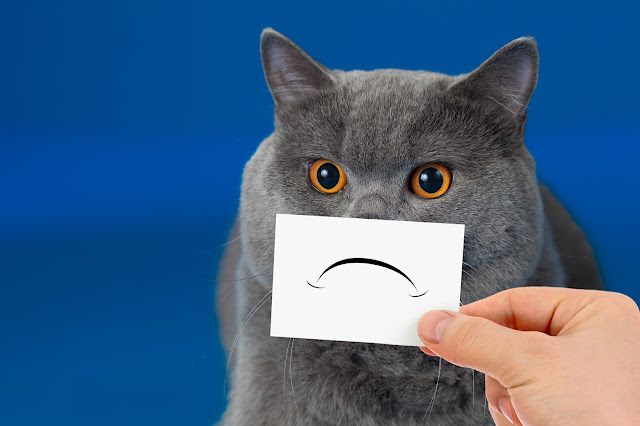A few weeks ago, we created a survey just for fun to ask our readers about their cats’ emotions. Today it’s time to reveal the 100% unscientific results. (I have to say “100% unscientific” just in case anyone is tempted to use our results in their research paper, which is really not a good idea!)
The survey
To recap, we asked readers how often their cats
expressed six “primary” emotions (anger, joy, sadness, disgust, fear, surprise)
and four “secondary” emotions (jealousy, shame, disappointment, compassion).
Primary emotions are those that are innate; they are hardwired into the brain.
The primary emotions used in our survey are the ones identified by psychologist
Paul Ekman. Other researchers have listed different primary emotions or a
different number of them. Secondary emotions are how we feel about or judge our
primary emotions.
Some people think animals don’t experience emotions. That is
poppycock (to use the technical term). Anyone who has spent time interacting
with non-human animals and actually paying attention to them should recognize
that those animals experience emotions. Other people think that animals have
emotions, but only primary emotions. We’re not so sure about that either, since
the experts can’t even agree on which emotions are primary and which are
secondary. Emotions, wethinks, are not always so easily defined or categorized.
In any case, our survey respondents were cat guardians who told
us about the emotions they observe in their cats. If we were to ask the cats
directly, we would surely get different results.
The data
And speaking of results.… We got 19 total responses, which
was fewer than we’d hoped for, but it’s not bad considering it’s our first
survey and we honestly did not promote it as thoroughly as we could have.
The most commonly reported emotions were joy, fear, and
surprise:
- Joy—17 respondents (94.44%) reported that their cats “sometimes” or “often” expressed joy.
- Fear—16 respondents (84.21%) reported that their cats “sometimes” or “often” expressed fear; 3 respondents (15.79%) said their cats “never,” “very seldom,” or “rarely” expressed fear.
- Surprise—16 respondents (84.21%) reported that their cats “sometimes” or “often” expressed surprise.
Next most common were anger, jealousy, and disappointment:
- Anger—14 respondents (73.68%) reported that their cats “sometimes” or “often” expressed anger.
- Jealousy—14 respondents (73.68%) reported that their cats “sometimes” or “often” expressed jealousy.
- Disappointment—14 respondents (73.68%) reported that their cats “sometimes” expressed disappointment. No respondents said their cats “often” expressed disappointment.
The least common emotion—by far—was shame:
- 15 respondents (83.33%) said their cats “never” expressed shame.
- 1 respondent (5.56%) said their cats “sometimes” expressed shame.
- 2 respondents (11.11%) said they did not know if their cats expressed shame.
Sadness was also less commonly reported than many other emotions:
- 10 respondents (55.56%) said their cats “sometimes” expressed sadness.
- 3 respondents (16.67%) said their cats “never” expressed sadness.
- No respondents said their cats “often” expressed sadness.
Disgust and compassion fell in the middle:
- 13 respondents (68.42%) said that their cats “sometimes” or “often” expressed disgust; 1 respondent said their cat expressed disgust “only at dogs.”
- 12 respondents (63.16%) said their cats “sometimes” or “often” expressed compassion; 4 respondents (21.05%) said their cats "never" expressed compassion.
Conclusion
So what does it all mean?
We conclude that the respondents mostly have happy cats who sometimes
are surprised by something and sometimes feel afraid. They also sometimes feel angry,
jealous, or disappointed. Less often, they are disgusted or they express compassion.
We further conclude that most of these cats have no sense of shame and don’t
hold on to feelings of sadness. On average, they sound pretty emotionally healthy
to us.
One thing to keep in mind: The emotions reported are the human respondents' interpretations of their cats' behaviors and expressions. What do the cats really feel? You'll have to ask them!
Thank you to all those who participated in our survey!




That was an interesting survey.
ReplyDeleteAs if cats will EVER really tell hoomins how they feel!
ReplyDelete"survey says!!" This was FUN!!! catchatwithcarenandcody
ReplyDeleteWe did the survey! And we are HAPPY to see the results! And I must say I, Marvelous was not at all surprised!
ReplyDeleteI can't wait to pawticipate in your next one!
Purrs
Marv
guyz....we think de food servizz gurl cheeted on thiz sir vay... coz when it comez ta dizz gust
ReplyDelete..... we canna STAND turkeez.....bet her dinna menshunz that tho...did her ~ ☺☺♥♥
Great survey. I think they experience everything except shame :)
ReplyDeleteThat's so interesting! Sounds like Mudpie's answers were much like most others :)
ReplyDeleteThat was a fun survey!
ReplyDeleteFlynn was always happy. If I told him no for any reason though, eg it was pouring with rain and he wanted me to take him for a walk, he would lie on the bed and sulk. He had such an expressive little face.
We are not surprised that cats feel no shame! :)
ReplyDelete